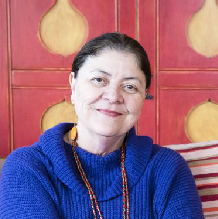ENTREPRENEURIAL WORKFORCE
to enrich the biomedical innovation pipeline.

The Value of Diversity in Biomedical Innovation
NIH values the breadth of varied perspectives that come from having a pool of highly talented scientists from diverse backgrounds, including women, members of racial and/or ethnic minority groups, people with disabilities, and those from disadvantaged and rural population centers.
Not only is NIH committed to diversifying the national scientific workforce, but SEED actively seeks diverse perspectives to enrich the biomedical innovation pipeline. With more than $1.4 billion in annual funding and ongoing entrepreneurial education and commercialization support, SEED programs empower companies to flourish throughout the evolution of their technology and company and to leverage the unique perspectives brought to bear by diverse individuals and institutions.
If you’re developing an early-stage product or service that has the potential to improve human health or conducting biomedical research, you have a place here.
Free Applicant Assistance Programs
- NIH Applicant Assistance Program to help entrepreneurs that are new to the NIH Small Business Programs submit a competitive Phase I SBIR or STTR application
- NIAID Applicant Assistance Program for companies planning to apply for National Institute of Allergy and Infectious Diseases (NIAID) Phase I, Phase II/IIB, Fast Track, or Direct to Phase II SBIR or STTR funding
- Health Disparities Pre Application (HDPreApp) Program that aims to improve a Phase I, Direct to Phase II, or Fast-Track application's scientific merit and commercialization plan
Entrepreneurial Training Programs
- The 2024 BIO-Entrepreneurship Capstone represents a unique opportunity for academic scientists – including students (undergraduate and graduate) and postgraduate research fellows – to learn about life science research & development/commercialization and bio-entrepreneurship. The three-staged program begins with design thinking and the fundamental principles of Lean Startup, advances through immersive learning in customer discovery and business hypothesis validation, and ends with a select group attending the Annual International BIO Convention. Individuals from resource-limited institutions, as well as HBCUs, HSIs, and Tribal Colleges and Universities, are encouraged to participate. Candidates who are new to the NIH funding ecosystem are encouraged to register, as no prior funding or active NIH project experience is required.
- I-Corps at NIH accelerates the translation of biomedical research to the marketplace by providing innovation and entrepreneurship training to NIH and CDC-funded Phase I SBIR and STTR grantees. The I-Corps curriculum provides teams with real-world, hands-on, immersive learning focused on refining their business plan by conducting customer discovery activities, as well as participating in weekly web-based seminars.
- Current small business awardees can receive a Diversity Supplement, which provides additional funding to support research and entrepreneurial experiences for individuals from diverse backgrounds throughout the continuum from undergraduate to the faculty level.

[NIH small business funding] gave us the preliminary data that allowed us to approach investors and Big Pharma to fund the amount needed to move into phase two and phase three.

The grant gave us the funding to hire curriculum writers, to pay teachers to do pilot testing of the kits, and to go to science education conferences and present the kits; it gave us money to pay stipends for teachers who wanted to hold their own workshops, and money to provide the kits for the workshop. It really allowed the company to grow much more dramatically.

[SBIR] funding was absolutely critical to getting us off the ground.

Our very first funding came from the NIH. The origins of our success came from an NIH-funded project, and since then, we have been able to build on and expand our knowledge and tackle other pollutants.

[SBIR] has been a long, trying, but worthwhile journey...from multiple submissions that were not discussed...to applications that scored below the funding levels...to concurrent applications (one Phase II and a Phase I) emerging from the rigorous peer review process with impact scores in the “Excellent" range.

We were awarded a $1.5 million Phase II Small Business Innovation Research (SBIR) grant from the National Institute of Neurological Disorders and Stroke in 2018. That grant came at a time when follow-on funding was uncertain, and it allowed us to accelerate the development process and cover critical commercialization costs for our novel, bioabsorbable surgical clip. We’ve since focused our energy and resources on bringing this technology to market sooner, which will ultimately benefit patients and improve public health.
I would love to see more Native American representation in the SBIR program. Including entrepreneurs from different backgrounds is key to solving “unsolvable” problems and is critical to forging new paths in science and healthcare.

In terms of venture capitalists for minority businesses, it is a really unfair playing field. So, the fact that SBIR funds minority businesses like ours is huge because otherwise, we would not get any investments.

This funding allowed me to achieve a scientific breakthrough and now I can talk about early detection, and I can talk about cancer, fibrosis, and changing the industry.






